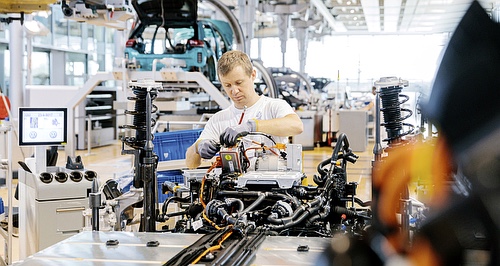Make / Model Search
News - General News - EmissionsNiche brands handed ICE ban lifelineELECTRIC ERA: Europe will only allow the sale of new zero-emissions vehicles from 2035, although eFuel may keep some ICE cars around for longer. Low-volume car-makers get more time to hit EU CO2 target, eFuels not ruled out5 Jul 2022 By MIKE FOURIE THE European Council last week ratified the proposal to phase out new cars with internal combustion engines (ICE) by 2035, but concessions were made to give low-volume manufacturers more time to achieve emissions targets and to explore the possibility of allowing some vehicles to operate exclusively on eFuels in future.
Environment ministers of EU member states struck a deal on the proposal after five nations – one of which was Italy, the home of the supercar brands Ferrari and Lamborghini – gave up demands for a five-year delay to the plan to ban carbon dioxide tailpipe emissions from new cars in Europe by 2035.
The agreement effectively defines member states' negotiating stance for further talks with the EU Parliament and European Commission on the final shape of the so-called ‘Fit for 55’ landmark greenhouse gas-reduction package, Bloomberg reports.
“I have full confidence that the European car industry can manage,” Automotive News Europe (ANE) quoted European Commission executive vice president Frans Timmermans as saying.
“Our car-makers are among Europe's industrial leaders and they can continue to be that as they embrace this global shift,” he said.
“Thanks to this agreement, Europe is putting itself at a leading position in terms of addressing climate challenges and technology,” French energy transition minister Agnes Pannier-Runacher told ANE.
“We're also ensuring a just transition for each member state, each territory and each citizen.” Italy, Portugal, Slovakia, Bulgaria and Romania had lobbied for an extension of the deadline from 2035 to 2040, but it was unlikely that all 27 countries would agree to it.
However, an agreement was reached that would enable brands that sell fewer than 10,000 cars or 22,000 vans a year to circumvent the interim targets of a 55 per cent reduction in CO2 for the former (and 50 per cent for the latter) by 2030.
“As far as niche producers are concerned, the exemption is up to the end of 2035,” Mss Pannier-Runacher was quoted as saying.
The “derogation” certainly suits the European small-volume car manufacturers alliance (ESCA), which represents brands such as McLaren, Aston Martin, Bugatti, Pagani, Koenigsegg, Ineos Automotive and Rimac (but not Ferrari or Lamborghini, although the Italian supercar brands will ultimately benefit from the development).
To facilitate compromise, Europe’s car giant – Germany – called on the commission to propose allowing vehicles to run exclusively on carbon-neutral fuels after 2035.
Supporters of eFuel, for which, as GoAuto has reported, Porsche and HIF Global plan to construct a production facility in Australia in 2024, now have until 2026 to prove the fuel’s usefulness to the European Union’s carbon-reduction targets.
Mr Timmermans said the commission would “have an open mind” as to eFuel’s effectiveness. Meanwhile, the European Automobile Manufacturers' Association (ACEA) said it agreed with the agreement, but added that electric-vehicle infrastructure needed more support and that access to EV raw materials needed to be secured in Europe.
“To be very clear: the automobile industry will fully contribute to the goal of a carbon-neutral Europe in 2050," said ACEA president and BMW CEO Oliver Zipse.
"But the decision of the Council raises significant questions, such as how Europe will ensure strategic access to the key raw materials for e-mobility.”
He added that "hydrogen and other CO2-neutral fuels can play an important role in decarbonizing road transport."
The general secretary of the European Association of Automotive Suppliers (CLEPA), Sigrid de Vries, said: “We are glad to see support from Council for vehicles running on renewable fuels. (We continue to support) a technology-open approach, with a smart and sensible technology mix of electric vehicles and a measured use of alternative solutions involving advanced internal combustion engine technology."
However, "we are concerned about the lack of commitment when it comes to the deployment of charging and refuelling infrastructure, as well as the capacity for producing renewable electricity and renewable fuels."
"Going forward, criteria such as affordability, access to raw materials, emissions along the life cycle and employment in the sector need to be considered."
Although the environmental group Transport & Environment welcomed the accord, it called on members of the European Parliament to "shut down any possibility of a loophole for synthetic fuels," saying they are "a far less efficient use of renewable electricity than direct electrification."
“The end of the combustion engine is great news for the climate," said Julia Poliscanova, senior director for vehicles and electric mobility at the group. "But new proposals on eFuels are a diversion."  Read more |
Click to shareGeneral News articlesResearch General News Motor industry news |












Facebook Twitter Instagram